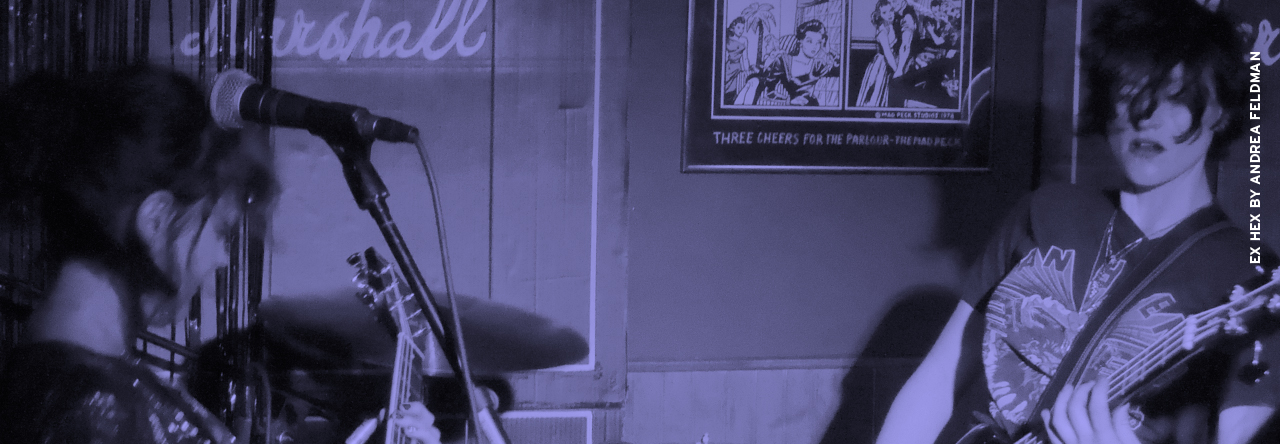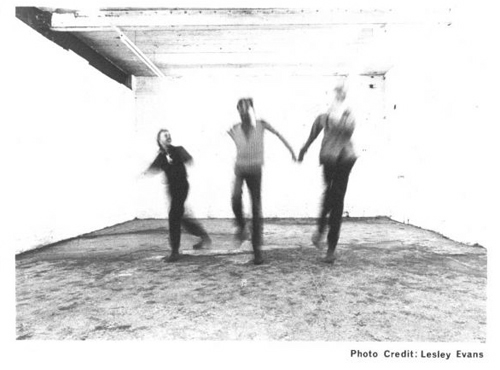An airless former meat storage unit in an industrial corner of Brixton in London hardly sounds like a place with any potential to spark creativity. Originally discovered by David Cunningham (Flying Lizards), Cold Storage (as it became known) became the de-facto home to London trio This Heat, who recorded there virtually every day (sometimes for days at a time) between 1977 and 1981.
Initially it didn’t seem like a viable space. Dotted here and there with old blood (like an au naturel, three-dimensional Jackson Pollock), covered in metal cladding and with no source of light or air, it had a forbidding, even negative energy about it. As This Heat drummer Charles Hayward noted in an interview with The Wire [August 2005]: “We opened it up and the lights didn’t work. We had torches —the beams entered the space and there was a subclimate in there. There were clouds; it was really, really cold. And I quite genuinely had this picture in my head that we were going to see the red, glinting eyes of some sort of albino wolves. We couldn’t quite work out how big it was. It was a very strange space, a mysterious sort of cavern. It was very primeval, like an installation piece.”
Despite the aura of unease, the group was determined to make it a place where their creative processes would bloom. To counteract the oppressiveness, they filled the space with “music and lots of creativity.”
That they did. This Heat accomplished a great deal in their relatively short existence. It’s difficult to encapsulate their sound in words. The ground so often shifts. At times nearly evanescent and muted, at others almost brutally concise, the group’s incredibly dense, full-bodied sound is three-dimensional, surrounding you with a fascinating array of textures and colors. It is so complete as to seem architectural, but it is not oppressively so.
In fact, this is music that is explicitly anti-oppression. For a group that worked in a nearly hermetic and obsessively detailed manner (sometimes staying in the studio for days on end) the music constantly fights against inertia and stagnation. Taken as a whole, the group’s music is consistently forward-thinking (in an organic rather than self-conscious way), conceptually vibrant, and radical. The lyrics are sung in a deceptively deadpan tone, but get beyond that and you discover explicit political commentary and deep emotional engagement. The group’s masterpiece, Deceit, was written during the Cold War/Reagan/Thatcher years, but it of course resonates deeply with our own current political climate. If anything, the group’s thesis statement has gained in power since it was first released in 1981.
Long frustratingly unavailable, the group’s entire output has recently been re-issued by Chris Cutler’s label, ReR. The 6-CD box set, Out of Cold Storage, is a treasure trove: the two studio albums, This Heat and Deceit, are here. So is “Health & Efficiency,” possibly the group’s finest moment, and the closest they come to an out-and-out pop song. In addition, there are discs collecting the group’s Peel sessions (Made Available), a compilation of live performances, and some alternate takes (Repeat).
You’ll also find “24 Track Loop,” which was until recently only available on the Soul Jazz comp In the Beginning There was Rhythm. True to its name, the song was built from a 20-second loop of two organs and viola recorded in mono and manipulated in real time through the mixing desk. This was then looped again, varispeeded to different pitches, and made into one long loop that was then edited down to the final version. (Pre-ProTools, no less.) The box set includes an alternate version, “Repeat,” that stretches out to nearly twenty minutes. Both sound as though they were made tomorrow. Although inspired by dub techniques, “24 Track Loop”’s use of pitch-shifting, echo, and reverb prefigures Jungle and Drum n’Bass by twenty or so years.
Cold Storage was not just a home base for This Heat. It also served as a rehearsal and recording studio for many bands, including the Raincoats and Young Marble Giants, Flying Lizards, Ut, Essential Logic, Robert Wyatt, The Homosexuals, Test Dept., and many others.
Sadly, the studio ultimately fell victim to mismanagement and went bankrupt. But not before giving us a wealth of incredible, varied music. Thankfully a great deal of it is being re-issued and reevaluated.
![]() Flying Lizards, “Her Story” [vocals by Vivien Goldman; for more of her work visit this recent post from Postpunk Junk.]
Flying Lizards, “Her Story” [vocals by Vivien Goldman; for more of her work visit this recent post from Postpunk Junk.]
![]() The Homosexuals, “In Search of the Perfect Baby”
The Homosexuals, “In Search of the Perfect Baby”
INTERVIEWS
Charles Hayward Interview | from PERFECT SOUND FOREVER • Interview with Robert Wyatt about Cold Storage | from THE WIRE • Interview with Colin Newman about Cold Storage | from THE WIRE
BUY
Out of Cold Storage| ReR USA | Flying Lizards | Amazon | The Homosexuals, Astral Glamour BOX SET| Amp Camp



mike
Someday I’m finally going to do an article on Foel Studios in Wales, where Young Marble Giants recorded Colossal Youth. My Bloody Valentine recorded at the same studio years later – it would be interesting to compare and contrast the different working styles.
jeff
Welcome to the magical world of music bloggery!
Andrea
should have specified that it was my first post in the forums! I’ve actually been music blogging for (nearly) the past year.
But thank you! And hi!
jon
Another awesome post! You do your homework.
Andrea
Thanks, Jon!
jon
I just discovered that the This Heat reissue costs $100! Sheee-it. I don’t know if you take requests, Andrea, but I am very curious about the history of Little Annie (a/k/a Annie Anxiety), and you seem like just the person to research her background!
Andrea
I think the box set is $80 from the link I provided. (I think there might even be free shipping too if I’m not mistaken.)
I know that’s still pricey, but it helps a little…
It really is an amazing box set. The book alone is a fantastic history of the band.
I was thinking of doing something on Annie Anxiety. I’d hoped to make it to her recent show in NYC, but alas, no. I did spot her when I saw Kid Congo in March!
I need to hear her new record.
Debbie Curtis
Charles Hayward used a 1953 Maestrovox Keyboard on all of the ‘This Heat’ recordings. This now rare early valve synthesizer was designed and built by my Grandad and given the recent interest the sale of one created on Ebay UK I have created a page of Maestrovox history including pictures, original brochures and press cuttings etc on my website. http://www.debbiecurtis.co.uk/id99.html